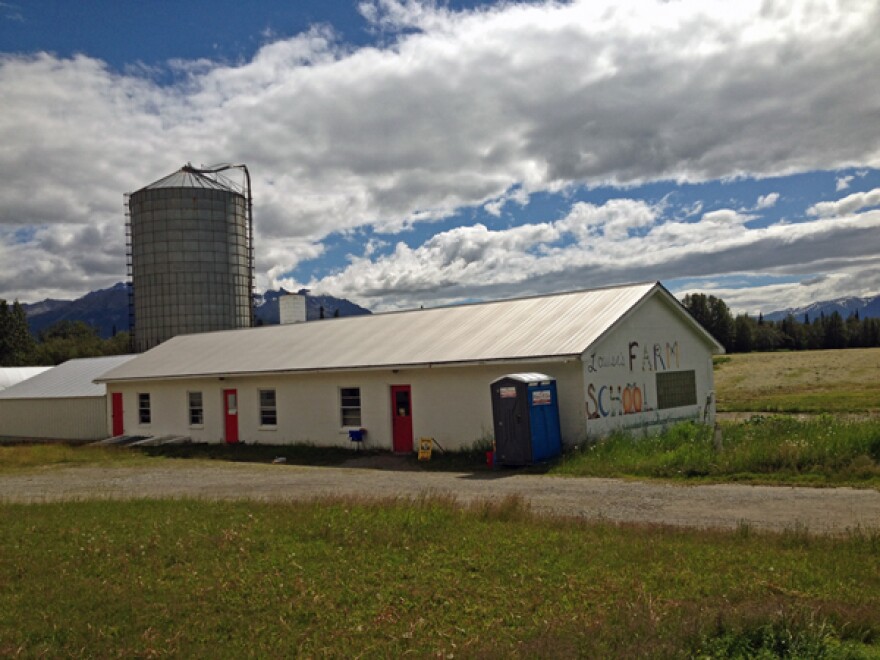A dozen or so five- and six-year-olds are playing a game in the shade of a gnarled apple tree. The game involves a frog and a detective, somehow. The kids all are enjoying themselves, shrieking and laughing. It's all part of a summer program at Spring Creek Farm.
When a former pilot, and WAC veteran decided to take advantage of homesteading opportunities in Alaska after World War II, local Palmer colonists laughed. But a decade later, Louise Kellog's dairy farm became the most successful in the area. Before her death, Kellog put 700 acres into a trust, and offered it's management to Alaska Pacific University. Steve Rubenstein, APU's director at the farm, says the farm environment is the classroom setting for the university's unique Masters in Outdoor and Environmental Education program.
"What we have is a Masters program in Outdoor and Environmental Education," Rubenstein said. "This would be our tenth year, headed in now. It is part of the outdoor studies department at Alaska Pacific, with the intention of training outdoor educators and environmental educators for the next level of professional work here in state."
Rubenstein says there is no other program in the state doing the same thing.
"We wanted to use the environment that we have here in Alaska in this context, in order to really be able to do something different than what other folks were doing," Rubenstein said. "And we have an outdoor studies program already that's training a lot of people that are working for agencies."
"When we first started the program, the primary focus really was teachers working in the school system perhaps, who wanted to do more environmental education with their classes, but needed the extra training to do so, people that were looking to work for agencies developing curriculum for places like the Murie Science Center, Fish and Game, Fish and Wildlife."
APU operates Spring Creek as a satellite campus, and is attempting to further the farm as an educational asset.
Plans are in the works to eventually house a charter high school on site, with an emphasis on outdoor education and natural resource skills.
Currently, the farm is home to Louise's Farm School, named in honor of Kellog. Megan Rock is the coordinator at the Farm School, and she shows me around.
"So, like I said, this is an old chicken coop that has been converted," she said. "So this is where our younger students, this is where our Chickadees, classes are conducted. And they learn about using their five senses to experience the outdoors."
Rock leads the way through a corridor to a much larger room.
"The Eagles and Owls,classes are housed back here, and they are studying more-so about culture and community. Rock said. "Athabascan culture because the farm itself is held on Athabascan land, and community service programs, so we are doing stream bank restoration and we are doing out reach with non profit programs like My House, and teaching the kids about social responsibility."
The farm school serves home schooled children, ages 5-13. Rock works with three companies that provide correspondence courses for home-schooled children. Louise's Farm School just received a state agricultural division grant for 2014. Rock says the funds will be used to develop curriculum to teach youngsters about local foods and local farms. She calls it place-based education.
"The long term projects that we are working on are really allowing students to experience learning in different ways," she said.
The kids will learn about farming from seeds to harvest, Rock says.
We go down to the basement of Louise's original house, where seeds are sprouted under grow lights.
"It's a little bit dark, so watch your step. We are using this as our seeding area for the farm"
Downstairs, trays are packed with seedlings of all kinds, peeping up from trays lighted over head, while a fan whirs to circulate air and heat.
"So early April, this place is humming. It's really neat for the kids to come in here and see this happening."
Outside, an early spring has coaxed lettuce, kohlrabi and scallions to sprout in neat rows.
Nearby, the farm's grower Josh Valler is guiding volunteers who are planting pepper seedlings in a hoop house. He says the farm's learning programs are right in step with the "get kids outdoors and moving" trend.
"It's really important. I mean, we are looking at a new diabetic generation," Valler said. "And the work here is extremely healthy, getting kids out into the field to do the labor and to understand where food comes from. "
Although APU calls Spring Creek an educational farm, at present some acreage is leased for hay production, and the vegetable garden yields produce for local CSA subscribers and an Anchorage farmers market. Round hay bales and idle reaping machines stand in the neat fields, although the dairy cattle are long gone. Steve Rubenstien glances at the view of the Chugach Mts. out his office window. Rubenstein says, as the Valley population continues to expand, open land will become ever more valuable.
"This may well be one of the last acreages of its size this side of Palmer," Rubenstien said.
Rubenstein says Louise would be proud that her farm is being used for a school.
"She wanted this farm to continue, but also to continue as a place for kids,of all ages, from college on down, to have access to the natural world," Rubenstien said.
But Matanuska Valley farmland is under seige by developers, and Rubenstien says that forty acres flanking the farm is already earmarked for housing. And he is only too well aware that if the farm were ever to become a financial burden to APU, the bulldozers would be standing at the gate.
Louise Kellog died on July 24, 2001, in Palmer. Thirteen years later, her vision to keep open spaces available for learning about the natural world, is very much alive.


